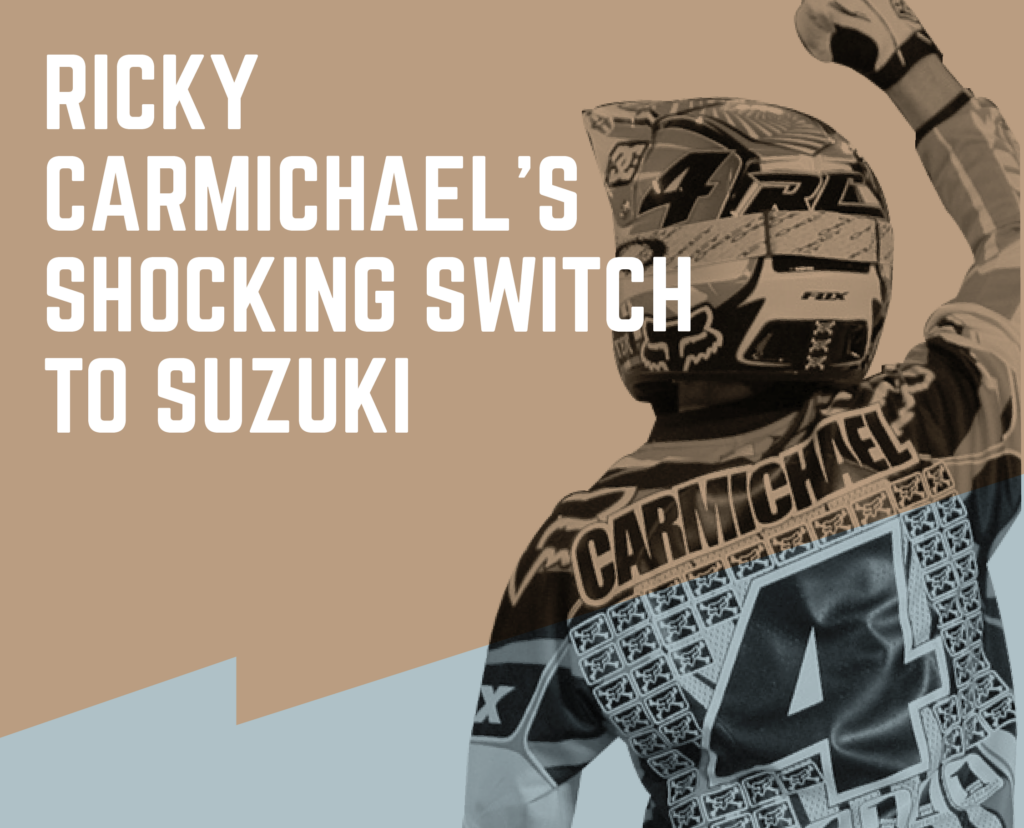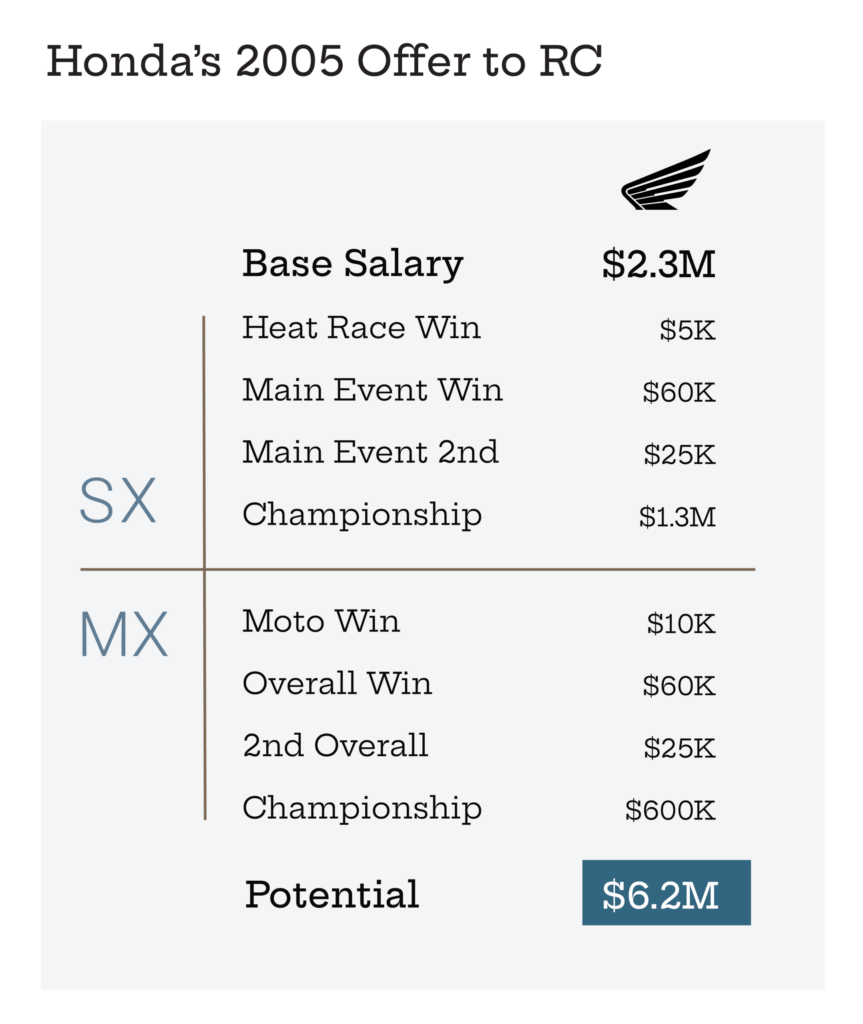
Part 4: Honda offers Carmichael 6.2 million reasons to stay
Gary Christopher spent 35 years working at Honda and literally saw it all as far as Honda’s involvement in motocross went. He started two years before Gary Jones won the 1973 Pro Motocross championship on a 250 Elsinore, the company’s first title in the USA. Christopher struggled to recall Honda’s immediate response to Moorman’s memo or what action they took through the final weeks of the 2003 summer, but he does remember the unique nature of the request.
“It was absolutely something that we had never dealt with before,” Christopher says of Moorman’s proposal for guaranteed compensation. “Never seen before, because all of our contracts in racing were performance based.”
Reading the memo over again nearly 20 years later stirred up a recollection of how the market was pivoting.
“You could see how the racing side of our industry was starting to recognize that there are far, far more benefits to the OEMs from racing than simple wins on the track,” Christopher says. “Guys like Ricky were starting to transcend the motorcycling side of things and become very important and famous in their own right.”

Carmichael finished the 2003 Pro Motocross championship winning five of the final six motos and the title, his fourth consecutive in the premier division. Five weeks separated the end of the season from the Motocross of Nations in Belgium. After a short rest, Carmichael flew to California to start testing for the 2004 Supercross season. Despite riding – and loving – the stock 450 at home, he still committed to riding a 250 two stroke in Supercross.
While testing fuel in Corona, California Carmichael’s left foot got caught in a rut and ripped from the footpeg. He instantly felt fire in his knee but the pain faded after a few minutes. He finished the test and watched his knee swell as his body cooled down.
An MRI showed a completely torn anterior cruciate ligament (ACL) but he put off surgery for two reasons. First was prior experience; at 13 he tore his right ACL and put off surgery for almost three years. So he felt he could manage without an ACL again. Second, his contract extension still wasn’t complete. He made the decision to move forward with Supercross preparations but he planned to take off the following summer for surgery and recovery.
Carmichael said his knee popped out several times at the MXoN but, even with the King of Belgium looking on, it didn’t stop him from beating Stefan Everts in the one moto format final. Team USA lost the event, but Carmichael took individual honors. Just five days later, he raced in Las Vegas at the US Open of Supercross.

In Vegas, nearly three months after sending the renegotiation proposal, Moorman, Carmichael and Ray Blank met in the office of the Honda race truck. Looking back, Moorman now believes it was antithetical to Honda’s policy to re-negotiate the terms of an existing contract. “Honda never made that proclamation,” Moorman wrote, “However, we made no negotiation progress through the summer of 2003.”
Moorman is right. In the February 2005 issue of Racer X Illustrated, Ray Blank granted a rare interview to reporter Eric Johnson. He said Carmichael’s agent (presumably Moorman) originally requested a negotiating meeting in the spring of 2003. Blank said he responded to this request with “Why?… We have two years left to go on our current agreement.” Blank said he was told that Carmichael wanted everything finalized before the end of the [2003] season. “No rationale beyond this request to comply was given,” Blank told Johnson. In the interview, Blank did not mention the July 2003 memo from Moorman.

Carmichael and Moorman left the US Open with a single sheet of paper. On Honda company letterhead, with the words “RICKY CARMICHAEL” center justified at the top, the ‘contract development worksheet’ was a one-page document filled with numbers in black and white. The contract years were for 2005 and 2006. The top number was the contract base fee: $2,300,000. Moorman had proposed a base of $4,500,000 (no bonuses) So, this was $2,200,000 less than the guarantee they sought.
Below the base fee was eight different opportunities for earning performance bonuses, including heat race wins, championships, moto wins, overalls and even $25,000 for each runner-up finish, which was not in his original contract. “Our ideas relative to restructuring the Honda/RC contract were not received well,” Moorman says. “The meeting fell flat.”

Blank saw it much differently. In the 2005 interview, he said Carmichael left the meeting “quite relieved,” a reaction that puzzled him. “It seemed as though he thought we somehow weren’t considering continuing into the future with him,” Blank told Racer X. “I couldn’t think of any reason that would have crossed anyone’s mind.”

Blank had confidence in Honda’s proposal. “The figures that we included in that offer were far in excess of the 2002-2003 amounts and commensurate with his incredible performance,” he said.
The amounts certainly increased but the phrase “far in excess” isn’t an accurate description. Carmichael’s original contract included a multi-championship accelerator clause. So, his base salary for 2004 was already scheduled to increase from $1,500,000 to $2,000,000 because he won at least two championships in the first two years of the agreement. The way Carmichael saw it, he was only getting a $300,000 base fee bump for 2005.
The race win bonuses increased 20% from $50,000 per to $60,000 per (MX and SX) and the Supercross championship bonus rose 30% from $1,000,000 to $1,300,000 and the Motocross title rose 20% from $500,000 to $600,000. It was a lot of money but mostly based on potential. Although Carmichael won far more than not, he didn’t like to count those wins before they happened.
Carmichael finished third at the US Open and then returned to his routine of preparing for the following season. Six weeks later, it all came to an abrupt halt.